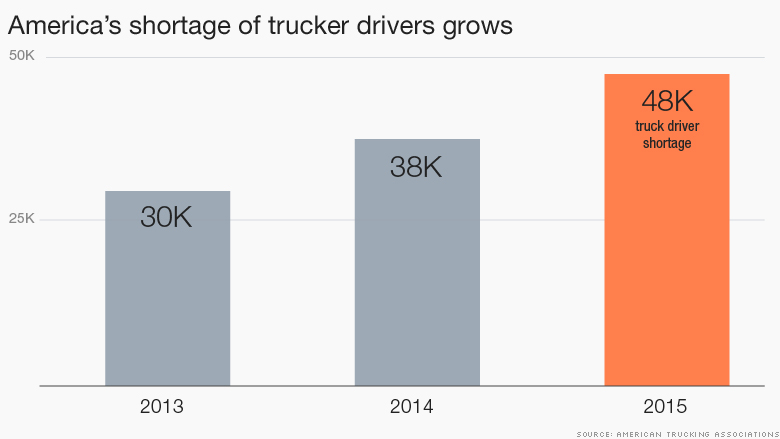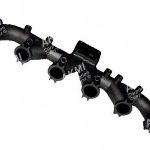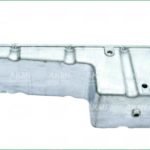
The heavy-duty trucking industry has a big demand for qualified truck drivers. There is also a need for qualified mechanics/technicians that are knowledgeable in repair work and know to use quality replacement diesel engine spare parts. If you like this world and the truck maybe you have to study a truck driver career
The freedom of the open road and driving cross country hauling freight doesn’t appeal to the younger generation. Most people, myself included, look to pass trucks while on the freeway and hate getting stuck behind them.
Short-haul driving (within city limits) doesn’t appear to be that appealing either. No one likes traffic, to begin with, and being stuck in the city with a truck & trailer three times the size of the average car daily doesn’t sound fun.
Truckinginfo.com posted an article in December of 2013 titled “Commentary:
The Ever-Pressing Need for Young Drivers and Technicians”. This article mentions that the average age of current drivers is 55+, as provided by the Bureau of Labor Statistics. It’s also mentioned that by 2020, there can be a need for 330,000 new drivers.
How to become in a heavy-duty truck driver

1. Requirements
If you want to become a truck driver you have to accomplish these requirements for the school you are gonna apply.
Obtain a CDL
The first step is to obtain a Commercial Driver’s License (CDL) from your state of residence, which comes with its own set of requirements.
Attend a Truck Driving School
To earn a CDL, you’ll have to attend a truck driving school. Each school may have slight variations in its truck driver requirements, but there are a few qualifications that are consistent across the board. If you’re wondering where the nearest school is or how you’ll pay for school.
Clean Driving Record & Solid Work History
Most truck driving schools require a clean driving record and a solid work history to enter their programs. Want more information on truck driver qualifications in your state? Pick up a copy of your state’s commercial driver’s manual at your local Department of Motor Vehicles (DMV) to become familiar with commercial driving rules and regulations.
Be at least 21 Years Old
The Department of Transportation (DOT) requires all professional truck drivers to be at least 21 years old.
Pass a Drug & Alcohol Test & Undergo a Physical
Prospective drivers also have to pass a drug and alcohol test and undergo a physical by an approved doctor before receiving their CDL.
2. Find a truck driver school

You have to find a good school that teaches you the necessary skills to be an excellent and prepared truck driver.
3. After you complete your preparation you have to find a job as a truck driver.
You can apply for this job on the Internet or in Institutions of truck drivers in your country.
We provide you some free job boards for this career on this web page.
3 benefits of the truck driver career
1. Stability and good pay
With a truck driver career, you have a lot of work opportunities in different companies and the job is well paid.
The median annual wage for a trucker that works for a private fleet,
such as a truck driver employed by Walmart, is $73,000, according to ATA.
The Labor Department pegs the median annual salary for all truck drivers at around $40,000.
2. Traveling.
As a truck driver you are gonna have a lot of travels and adventures around your country, that´s the reason why a lot of truck drivers love their jobs.
3.Freedom
you are not going to have a boss or other people disturbing you, you don´t have to deal with other employees or other things like that. You can take different ways to do your job, for example, you can be a local driver, a road driver, tanker driver and other different opportunities that you have as a truck driver.
Here are some misconceptions of being a truck driver:

- The stigma of super long days or terrible hours.
Most truckers will work longer days on average than most, but with new safety regulations and limits on how many hours a trucker can drive, it’s not as bad as it used to be. Trucking companies will need drivers at all times of the day, so different shifts are available. - Older trucks are not the easiest to drive.
While driving a manual transmission truck does take more focus and concentration, many newer trucks have automatic transmissions, so they will be easier to drive. - Short Haul drivers complain the company does not have enough drivers, hours are too long and not being appreciated.
Estimated shortage
Wikipedia noted that in 2005 there was an estimated shortage of 20,000 drivers and expected this number to increase to 111,000 by 2014. At one point, driver turnover for trucking companies was 136%. More drivers were either retiring, quitting, or being let go, they’re being hired as replacements or new drivers. It’s no  surprise that the short-haul drivers complain as they do.
surprise that the short-haul drivers complain as they do.
The article from Truckinginfo.com goes on to mention that the need for technicians/mechanics is worse than the need for drivers. The Department of Labor estimated 10 years ago there were 606,000 diesel technicians and the industry would need 205,000 more by 2014 to fill new positions and replace retirees.
Repair work
While the weight of diesel engine spare parts may not be a good reason, the complexity of the parts can be one. Also, the repair work may be harder compared to the automotive. Diesel engines and their spare parts are bigger/heavier than automotive engines and parts, but the repair processes are very similar.
When people think of a diesel mechanic, their first thought is probably of an overweight older gentleman, covered with grease spots and an outdated workshop. There are probably places like this, but most certified repair shops are very clean and professional.
Importantly the pay scale for drivers and technicians is comparable to other careers and geographical areas.
Years of experience and quality of work can be factors as well.
So, how can the shortage be overcome?

Creating more public awareness about the positives involved with being a truck driver or technician is one way. Having programs that can reach out and educate high school kids about careers in these fields can go a long way. Not all high school kids go on to college. Some kids may look at going to vocational schools for specialized training or they learn on the job.
Big time truck builders such as “Navistar, Peterbilt and Volvo” have established alliances or vocational training programs with schools like Universal Technical Institute (UTI) or Wyotech to help improve and educate recruits for a career as a diesel technician.
If you are at a crossroads in life or just looking for a career change, there is plenty of room in the trucking industry as a driver or technician.





